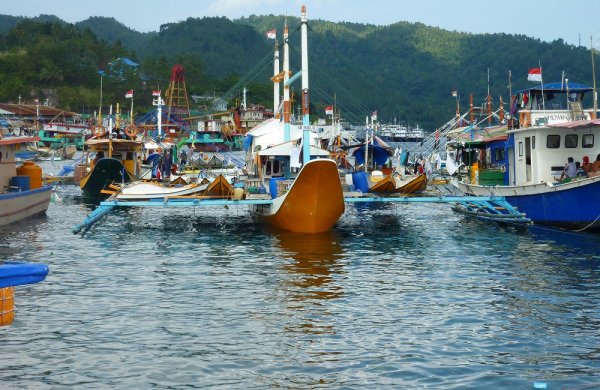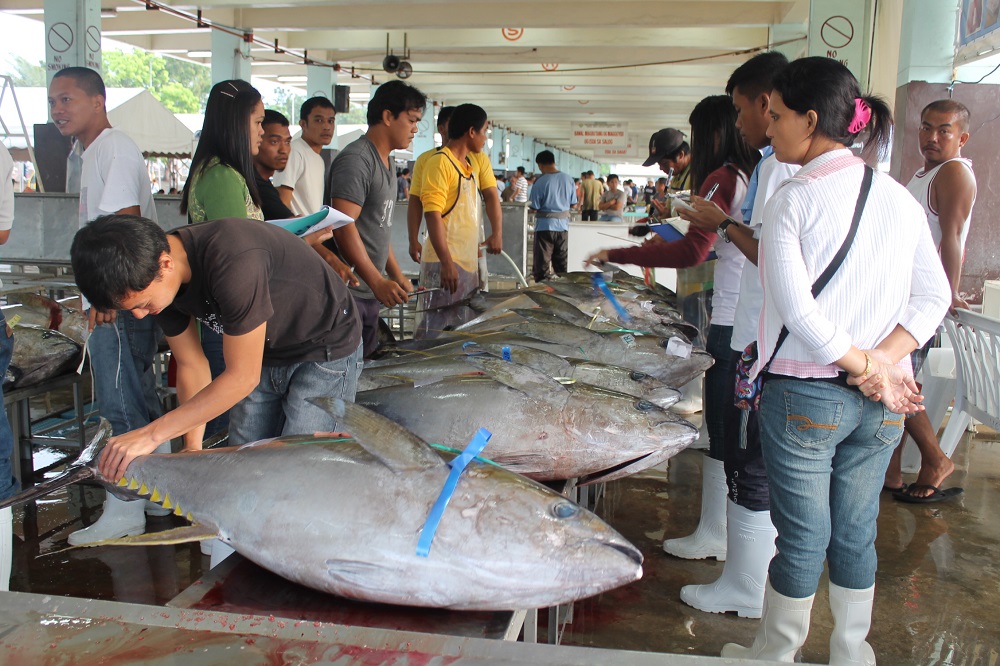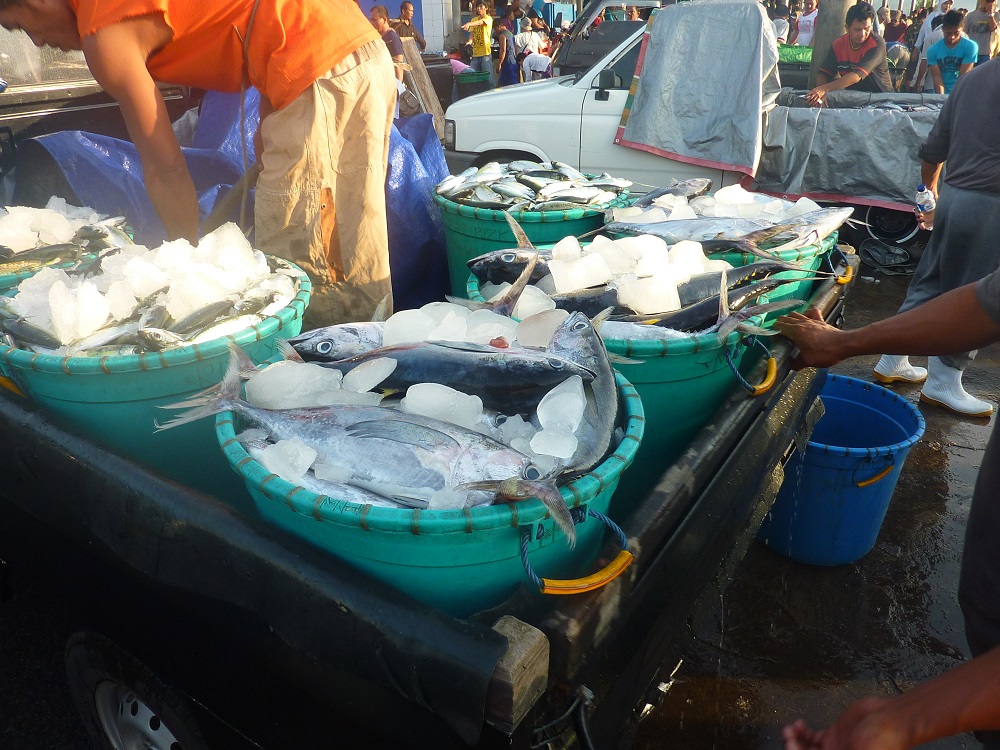
Longread
Sustainable tuna fishing and empowering local fishermen in the Western Pacific
The Western Pacific is home to the largest stock of tuna in the world. Since tuna is one of the most valuable fish species, the area attracts many fishing vessels, putting it at risk of overfishing. The BESTTuna programme explored how to improve the ecological management of this stock, while ensuring that surrounding island states benefit from sustainable tuna fishing in their waters.
‘The sustainable management of tuna is a long-standing and well-known challenge in the Pacific,’ says Simon Bush, Professor of Environmental Policy and coordinator of the BESTTuna programme. ‘However, we had not yet seen research conducted that covered social and environmental issues together, so we decided to develop a broad interdisciplinary programme.’
The programme came about after Lida Pet Soede, former representative of the Global Marine programme of WWF, brought potential partners together in Wageningen. She organized a Tuna Think Tank, in which INREF researchers, representatives of WWF, INREF and policymakers brainstormed about these issues. One of the outcomes was the BESTTuna programme. Pet Soede: ‘We were active in some countries in the western Pacific region in improving tuna fishing and coral reef protection. We wanted to stimulate a regional approach. BESTTuna helped answer research questions that arose from that wish.’
If we had just looked at the biological side, we would have come up with beautiful but ineffective systems
It was, therefore, a transdisciplinary programme from the start. Eventually, more than 100 researchers – MSc students, PhD students and postdocs – were involved. In addition to WWF Indonesia, there were collaborations with other NGOs, companies and governments. Simon Bush: ‘This research idea did not stem from science; it came from both NGO and business practice.’
Involved countries, disciplines of WUR and partners
Countries
Indonesia, Philippines, Western and Central Pacific Ocean region
Wageningen University chair groups involved
Animal Sciences: Aquaculture and Fisheries (AFI) Environmental Sciences: Aquatic Ecology and Water Quality Management (AEW) Social Sciences: Business Economics (BEC), Environmental Economics and Natural Resources (ENR), Environmental Policy Group (ENP)
Partners
Adessium, Bogor University, Indonesia (IPB), University of the Philippines in the Visayas (UPV), University of the Philippines in Mindanao (UPM), University of the South Pacific, WWF Indonesia, Australian National Centre for Ocean Resources and Security (ANCORS), University of Technology Sydney (UTS)
Certification and traceability
BESTTuna covered issues of stock allocation between Pacific Island States and distant-water fishing nations. Additionally, it focused on MSC certification of fisheries, fishing methods used and traceability of the fish caught.
The programme started at a time when sustainability was becoming increasingly important in the tuna value chains. This was a market-based development: consumers were increasingly demanding sustainable fish. This led to an increase in initiatives to improve sustainability in tuna fisheries, all of which made their own sustainability claims, and which in turn led to an emerging risk of coordination failure between claims of fishers and those of buyers. Moreover, if claims turned out to be false or inadequate, this would have potential repercussions for the credibility of all claims to sustainability, even for large labels such as that of the Marine Stewardship Council (MSC).

Empower fishermen with data
BESTTuna addressed these issues by making an inventory of active fishery improvement projects in the region, as well as helping local fisheries to meet data requirements. Bush: ‘Before, local fishermen could often not prove that they met certification criteria.’ These fisheries had their own tracking system that often did not match the requirements for certification.
‘There was virtually no enumeration of their activities. Through BESTTuna, we were able to empower fishermen by letting them take control over their own data.’ In order to do so, the programme helped to set up systems to enable the often-illiterate fishermen to keep track of their activities and thus to prove to potential certification organizations that their fish was caught in accordance with sustainability and fair-trade demands. ‘It put them in a better bargaining position, and they are now MSC and Fair Trade certified.’ This success story served as an example. ‘The system that we helped develop is now being implemented in other countries.’
This research idea did not stem from science; it came from both NGO and business practice
To get these systems working, an interdisciplinary approach was important. ‘If we had just looked at the biological side, we would have come up with beautiful but ineffective systems,’ says Bush. Also focusing on the social dimensions allowed the researchers to understand how tuna value chains are organized and how information is passed along them, which is vital for understanding and developing effective market-based approaches.
Systems approach
Another focus point of the programme was traceability of tuna stocks. Underestimation of the fish landed has been a worldwide problem for tuna. A BESTTuna research team used a mix of methods, ranging from literature research, expert interviews, and data analyses to field surveys, to get to the real number. They discovered that in Indonesian waters around Northern Sulawesi, the catch was up to 38 percent higher than what was reported.
‘Interdisciplinarity for this programme didn’t necessarily mean that everyone would work on multiple disciplines,’ Bush continues. ‘It meant taking a systems approach for everyone involved; MSc students that went to Indonesia to do their thesis in the social sciences had to learn how our data systems worked. We were always asking ourselves: if a certain intervention were implemented, what would it do to the economics, the biology of the fisheries, as well as wider social issues such as equity? You have to have an understanding the other field, even if you’re not using it yourself.’

Limits of certification
Due to its high economic value and impending scarcity, the tuna stakes are high. Bush and his team experienced this first-hand during the programme: ‘We published quite some articles with conclusions that were inconvenient for both companies and NGOs, even those that were partners in the programme.’
Pet Soede, who represented WWF at the time of BESTTuna, underlines that the research outcomes were not always positive for WWF as a partner either, but values this as an important outcome of the research. She cites the outcomes on the MSC certification as an example. These were of particular interest to WWF as a co-founder of the MSC. ‘The research illuminated the limits of what certification can do, and clarified that certification is not the answer to all the problems in this field. We learned from that as an organization.’
High stakes
An outcome that gained a lot of attention was their research into the certification of Dolphin Safe Tuna, an example of how the high stakes became tangible during the research. ‘A PhD student of mine and I were taken to an integrity inquiry by lawyers of the company that started this label, because our findings were critical of the Dolphin Safe Tuna label. We assessed their way of working and basically concluded that the label was less credible than other labels such as MSC. That meant that their label was less effective than they claimed. Of course, they were not happy with that, so we were challenged and had to account for every result, and every method that we used. That really drove home the value of organizing our data well,’ Bush laughs.
The system that we helped develop is now being implemented in other countries
Pet Soede says the programme was very valuable for WWF in terms of research output. ‘It generated a lot of information we could use in policy advice for example. But it also created a lot of buzz around the topic, which is something you cannot do as an individual organization.’ Bush, too, acknowledges the power of doing such a large research programme: ‘Because of the high stakes, our publications received a lot of attention. Many people in the industry saw our papers, which is why we could make such an impact.’
Constant dialogue
Bush concludes: ‘We certainly contributed to the development of sustainable seafood markets. On top of that, a lot of students who were involved in BESTTuna now have jobs in the sustainable seafood sector and are spreading that knowledge. I can’t go to an industry conference now without bumping into a whole group of Wageningen alumni.’
Bush has some recommendations for future projects: ‘Be very active in enabling constant dialogue between supervisors and students. Students from different disciplines in BESTTuna were having constant discussions, which was very valuable to the programme.’
Wageningen Integration For Impact
In order to tackle the world's pressing development-related social problems and to support the achievement of the Sustainable Development Goals (SDGs) by 2030, research for development must apply far more innovative interdisciplinary and participatory approaches.
That is why WUR launched a research programme in 2000 that is in line with the Sustainable Development Goals (SDGs).
Interested in the results?